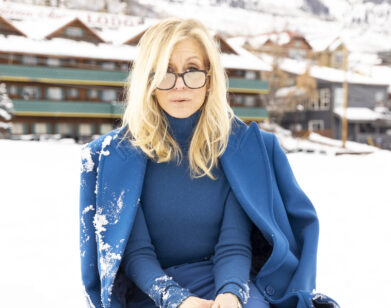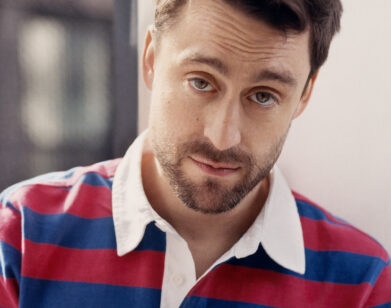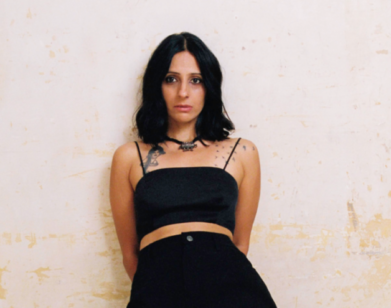IN CONVERSATION
Writer Courtney Zoffness and Jesse Eisenberg on the Radical Compassion of Art

Photo by Hannah Cohen.
I interviewed Courtney Zoffness about her debut from McSweeney’s, Spilt Milk. The book explores what we inherit from previous generations and pass on to our children, but it’s about so much more. My favorite moment in Spilt Milk is when her young son, dressed as a New York City police officer, tells the plumber that his mother was arrested. He’s referring to the time Zoffness committed felony retail theft at age 16, a crime for which she evaded serious consequences. It’s a brilliant and profound moment that sums up the collection: it speaks to culpability, privilege, and these thorny times in a way that’s unusual and comic, but also wrenching and impossible to reconcile. I was eager to hear the author’s thoughts on finding compassion and making art right now. –JESSE EISENBERG
———
JESSE EISENBERG: As a memoirist, you’re not doing what fiction writers do, which is bending the world to their ideas. You’re making connections in your own life, and imposing connections on seemingly unrelated experiences. How do you determine when an experience in your life or an event is worthy of being codified and written about?
COURTNEY ZOFFNESS: I’m actually trained as a fiction writer and write a fair amount of it. For me, the seed of a potential story in either fiction or nonfiction is often a point of tension or a question I can’t answer. “Holy Body,” for example, profiles my friend who became a gestational surrogate for a couple she didn’t know. I was astounded by her altruism and compelled to chase the question: How does one decide to act with radical compassion?
EISENBERG: Do you view your own work as some kind of benevolent offering to the world?
ZOFFNESS: I find art of all kinds to be nourishing and therapeutic but it’s hard to view my own work through this lens. That said, I hope it provides connection and comfort to someone.
EISENBERG: One of the tensions that you explore throughout Spilt Milk, which I find fascinating and identify with, is your “addled and inconsistent” relationship to Judaism. You have two essays which abut each other. One is the story of your time in Freiburg, Germany, a city you see as this bucolic Eden, yet every time you consider moving there, you’re reminded of the literal ghosts of anti-Semitism: the synagogue your friend can’t take you to because it burned down, the plaques on the sidewalk in front of houses of Jews who were killed in the camps. You are regularly shocked with the truth that maybe you will never feel comfortable there. The next essay is about your young, white son’s obsession with the NYPD, which amounts to a self-reflection of your privilege. There’s a tension between being a victim and also a person with great advantages. How do you square these realities?
ZOFFNESS: I do have a conflicted relationship to Judaism, but I want to make clear that I’ve not been the victim, personally, of deep anti-Semitism; it’s largely limited to impersonal incidents, like seeing swastikas at our local playground. Having grown up among practicing Jews and a steady diet of Holocaust history, I feel a responsibility to protect the faith. My partner isn’t Jewish and before we became parents, I made clear to him that I didn’t want to break the chain, so to speak. We are raising Jewish children, despite my religious irresolution. Simultaneously, I am alert to the ways in which as a white person, I do harm and I participate in various systems that do harm. I think part of being a self-reflective human is acknowledging the tension between coexisting truths—being a target and being a perpetrator—and figuring out how to navigate the space in and around them.
EISENBERG: While reading the book, I found it both incredibly easy and also kind of impossible to get a read on you personally. On the one hand, it’s a completely open, exposing book. I know more about your life than I know about my wife’s life. On the other hand, I can’t imagine you in the world because you seem to be such a self-aware person, constantly monitoring your own actions and how they relate to your ethics. How do you feel you present in the world?
ZOFFNESS: I think there’s a difference between a writer-self and a social-self. Writing is the sectioned-off space where I can meditate on experiences and observations that I’ve collected over time. Being a professor helps to scratch a similar itch. My students and I look closely at ideas and stories and language and, in the case of nonfiction, our lives. We ask questions and make connections and try to consider a subject from multiple angles. It seems like the right profession for a person with this inclination. Or maybe teaching has cultivated it?
EISENBERG: How has your writing changed since you started teaching?
ZOFFNESS: I’ve been teaching and writing hand-in-hand for most of my career. I went to graduate school at 23 on a teaching fellowship, so any stabs I made at professional writing were in tandem with learning how to teach. I can say that teaching continues to be influential to my work. I have students who challenge and inspire me, who are insanely brave with what they’re willing to write and share. I delight in watching them progress as stylists and adventure-seekers. It emboldens me.
EISENBERG: Your essay “Hot for Teacher” is about a male student who makes sexual advances at you in front of the class. You also expose him and take some literary revenge by writing about it. As a nonfiction writer, how far do you allow yourself to expose others?
ZOFFNESS: You noted earlier that you know so much about me, and it’s true that you know all the details I’ve included in these pages, but I actually exposed only a sliver of my life. I feel very protective of much that’s personal, including the lives of loved ones. When I explore material that’s fraught, as in my mother’s upsetting behavior, I try hard to render a fair portrayal, to make clear that her conduct isn’t spiteful or malicious, but more akin to the idea that “hurt people hurt people”—those in pain can cause others pain. As for my depicting my children, they’re really young in these essays so I feel okay publishing the work. Nowadays if I want to write about my oldest son, who’s 9, I ask his permission.
EISENBERG: If I had to sum up Spilt Milk in a word, I would say “empathy.” In every essay, even in the ones where you’re a victim, you’re not asking for pity. You’re trying to understand the perpetrator. I think that’s a wonderful theme and it’s written with such heart. There’s a gorgeous paragraph where you talk about ghostwriting a memoir for a Sephardic Syrian refugee and trying to get into his shoes. You write, “Here’s what happens when you slip inside someone else’s body. When you chant alongside his father on Shabbat, when you eat his mother’s lamb pies… your eyes change. You feel a sudden affinity for the Arabic writing on your neighborhood storefronts. You smile at the Hasidic women pushing strollers past yours on the sidewalk. No one, including you, looks exactly the same.” It really resonated with me as an actor. David Mamet says you have to be kind of a psychopath to truly believe you are the character you play, but I think the addendum to that should be, You’d have to be heartless not to have a better understanding of the world at large after playing a character. How much does that idea resonate with you? How much do you think of what you do as searching for empathy, and how does stepping into a role, so to speak, allow you to do that?
ZOFFNESS: I love this association. Ghostwriting and acting do seem to make similar demands of the artist, and I suspect that empathy helps one do both jobs well. I couldn’t relate to everything Sol, whose memoir I ghostwrote, did and said, but I had to try and make sense of it in order to render his perspective. Aside from ghostwriting, roleplaying probably applies more directly to my work as a fiction writer. I create characters who aren’t like me, who have flaws and blind spots that are different from my own, and the process of getting into their heads supplies me with a kind of understanding.
EISENBERG: What drives you to give people the benefit of the doubt when so often people are cruel or cutting? I’m thinking of the classmate at your Bat Mitzvah who called the affair a “Jew party.”
ZOFFNESS: Yeah, he was obnoxious.
EISENBERG: And yet the essay concludes with a description of that kid’s friend dying of a heroin overdose years later. It seems like you’re more interested in emotional revelation than you are in, say, a wry commentary on obnoxious teens. What did you intend with that ending?
ZOFFNESS: I wanted to highlight the insensitivity and oblivion of youth. On the day of my Bat Mitzvah, I was laser-focused on who sat at my table and the whereabouts of my boy-crush and the cotton balls stuffed in my bra. I thought little about the significance of the occasion or my supreme privilege—not that I blame my young self, I would surely do it again if I were 13 now—but teenage social dynamics can be all-consuming. I’m interested in how the stakes change as we age and evolve. I’m also compelled by how motherhood has given me new eyes; now I see the classmate who overdosed as somebody’s child.
EISENBERG: You explore a compelling push and pull of astrology in Spilt Milk. You seem to want the practice to be valid because it would make you feel less responsible for the pain in the world, but you don’t let it have value in your life. Are you looking for something that speaks to higher truths, even as you can’t bring yourself to subscribe to it?
ZOFFNESS: I think that’s a good way to put it. There’s a line in the book about how “I’m still waiting to believe in god.” I haven’t precluded the possibility that there’s a higher power or mystical system or an undiscovered apparatus that can offer explanation. I have an eagerness to make sense of shit and the world we inhabit doesn’t provide us with all the tools to do this.
EISENBERG: In that same essay, you talk about how you’ve checked the organ donor box on your driver’s license and feel fine giving away your corneas after you die, but you can’t imagine sacrificing nine months of your body to carry a stranger’s child. It’s incredibly relatable. Still, are you ever tempted to make yourself sound more generous on the page?
ZOFFNESS: I feel like my job as a memoirist is to be as thoroughly honest as possible even when it doesn’t illuminate me in the best light. I have been knowingly cruel. I have capitalized on my privilege. I want to earn my reader’s trust, so it’s important for me to include all of these things.
EISENBERG: You also faithfully capture the experience of being an anxious child and, now, an anxious parent, which seems especially apropos to quarantine.
ZOFFNESS: It’s interesting because I wrote most of this material pre-2020. I do think that the pandemic and its myriad challenges and ramifications have created a kind of collective anxiety, one especially pronounced for families with small children.
EISENBERG: Is there anything you would change in the book to respond to recent mayhem?
ZOFFNESS: I made late-stage edits to a few of the essays, including to the one about my cop-obsessed son. We live next door to a precinct station and our block was cordoned off for weeks this past summer in response to the Black Lives Matter protests, which my family and I joined. Shortly after I submitted the manuscript, my sons taped a sign in our window that reads “Treat Others Fairly! Black Lives Matter!” When we woke the next morning, folks across the street had pasted a counter-sign in their window which reads “All Lives Matter! We Love You NYPD!” Then our upstairs neighbors put a sign in their window that reads “All Lives Won’t Matter Until Black Lives Matter!” It’s a police block. People are literally taking sides.
EISENBERG: As a compassionate person who realizes that “hurt people hurt people” rather than hurt people are necessarily evil, how do you reconcile our country’s political polarization?
ZOFFNESS: Most of the people I know who voted for Trump weren’t voting for the man. They were voting for an issue. Or voting for a party out of a long-standing allegiance. Or voting against Biden. They were willing to overlook—and this is the part that haunts me—the ruthlessness and dishonesty and racism and misogyny. I have a beloved family member who supports Trump. It is agonizing to try and reconcile a good heart with a vote that green-lights so much suffering.
EISENBERG: Michelle Goldberg wrote a column in the New York Times about how the political climate ruined art for the past four years. This is how I feel, too. Everything that’s created is necessarily viewed through the lens of what it’s supporting and what commentary it’s making on either the political or social or cultural moment. I think art should be able to stand alone, to speak to broader truths in humanity and not some immediate moment that’s, hopefully, fleeting. Do you feel the same way about your work?
ZOFFNESS: I’ve found it hard to write fiction in particular, not so much for how it might be perceived, but for how it competes with reality. Somedays I’m engaged by the work, and other days I read a harrowing news story and my imagination seems extraneous. I think, if I don’t care about this, how can I expect anyone else to?
EISENBERG: Don’t you feel like you should just write something that takes place in 1572? Like it’s the only thing that won’t be missing the mark?
ZOFFNESS: That’s probably wise! On the flip side, I’ve been more desperate than ever to escape into literature as a reader. I crave transportation and the chance to inhabit other people’s brains and lives, whether imagined or real, past or present. That fact offers consolation for the arts—and hope.






